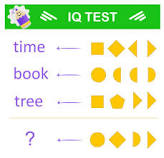IQ Test of Students in Educational Psychology
Title: Understanding intelligence level Tests in Instructive Psychology
Presentation:
Instructive Brain science uses different devices to survey and figure out understudies' mental capacities. One noticeable instrument is the IQ (level of intelligence) test. This article investigates the reason, parts, contentions, and ramifications of level of intelligence testing in instructive settings.
Motivation behind intelligence level Tests:
Intelligence level tests plan to gauge an individual's scholarly capacities in regions, for example, thinking, critical thinking, memory, and perception. Instructive analysts utilize these tests to assess understudies' mental assets and shortcomings, supporting the improvement of customized instructive techniques.
Parts of intelligence level Tests:
Intelligence level tests regularly comprise of various segments evaluating verbal and non-verbal abilities. Verbal areas might incorporate jargon, cognizance, and sensible thinking. Non-verbal areas frequently include visual-spatial thinking, design acknowledgment, and numerical critical thinking. The mix of these parts gives a far reaching perspective on a person's mental profile.
Debates Encompassing intelligence level Tests:
In spite of their broad use, intelligence level tests have confronted analysis. Some contend that these tests may not catch the full range of knowledge, ignoring innovativeness, the ability to appreciate individuals on a profound level, and down to earth abilities. Also, worries about social inclinations and financial variables impacting test results have prompted continuous discussions inside the field.
Suggestions for Instructive Settings:
Instructive clinicians use level of intelligence test results to fit guidance to understudies' particular necessities. Recognizing scholarly qualities takes into account improvement exercises, while tending to shortcomings guarantees proper help. Nonetheless, it's pivotal to decipher intelligence level scores circumspectly and consider them as a component of a more extensive evaluation tool compartment.
Social Awareness and Predisposition:
To address worries about social predisposition, endeavors are made to make socially fair intelligence level tests. Clinicians endeavor to foster inquiries that don't lean toward one social gathering over another, advancing equivalent open doors for different understudies.
Level of intelligence tests have constraints, for example, estimating just specific parts of insight and not representing genuine achievement factors. Perceiving these limits is urgent to keep away from overreliance on test scores and to see the value in the complex idea of human knowledge.
Understanding level of intelligence Test Techniques in Instructive Brain research
In the field of Instructive Brain science, IQ (intelligence level) tests assume a significant part in evaluating a person's mental capacities. These tests plan to quantify an individual's scholarly potential and are generally utilized in instructive settings to figure out understudies' assets and regions for development.
1. Meaning of intelligence level:
Intelligence level represents IQ, a mathematical portrayal of an individual's knowledge contrasted with the typical populace. Instructive clinicians use level of intelligence tests to acquire bits of knowledge into an individual's mental capacities, critical thinking abilities, and generally speaking scholarly potential.
2. Sorts of intelligence level Tests:
There are different sorts of intelligence level tests, each intended to evaluate various parts of knowledge. A few tests center around verbal abilities, while others stress non-verbal or execution based capacities. Instructive analysts select tests in view of the particular mental areas they plan to gauge.
3. Stanford-Binet Knowledge Scales:
One of the earliest and most notable level of intelligence tests is the Stanford-Binet Knowledge Scales. This test surveys both verbal and non-verbal capacities, giving a thorough outline of a person's mental assets and shortcomings. It is every now and again utilized in instructive settings to recognize talent or learning handicaps.
4. Wechsler Knowledge Scale for Kids (WISC):
The WISC is another broadly utilized level of intelligence test in Instructive Brain science, explicitly intended for kids. It surveys different mental spaces, including verbal appreciation, working memory, perceptual thinking, and handling speed. Instructive clinicians use the WISC to likewise figure out a kid's scholarly capacities and designer instructive mediations.
5. Raven's Ever-evolving Frameworks:
For non-verbal evaluation, Raven's Ever-evolving Frameworks is a well known decision. This test centers around dynamic thinking and critical thinking abilities without depending on language. Instructive therapists frequently utilize this test to survey people with language boundaries or to get a more culture-impartial proportion of insight.
6. Application in Instructive Settings:
Level of intelligence tests are significant apparatuses in instructive settings in light of multiple factors. They assist with distinguishing understudies who might require extra help or the people who could profit from cutting edge instructive projects. Besides, these tests add to the advancement of individualized schooling plans, guaranteeing that every understudy gets training customized to their exceptional mental profile.
7. Tending to Learning Handicaps:
Instructive therapists use level of intelligence tests to distinguish and address learning handicaps. By understanding an understudy's mental assets and shortcomings, instructors can execute designated mediations to help areas of trouble and improve in general learning results.
8. Social Contemplations:
It's pivotal to consider social variables while utilizing level of intelligence tests in assorted instructive settings. A few tests might have social inclinations that could influence results. Instructive clinicians should be aware of these predispositions and guarantee that evaluations precisely mirror an understudy's actual scholarly capacities.
Conclusion:
All in all, intelligence level tests assume an imperative part in Instructive Brain science, offering important experiences into understudies' mental capacities. Regardless of contentions and limits, when utilized morally and related to other evaluation devices, level of intelligence tests contribute altogether to understanding and supporting understudies in their instructive excursion.





Comments
Post a Comment